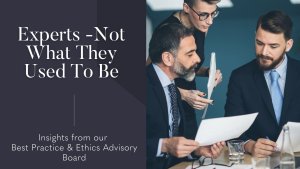
Thought Leadership Articles
Are AI bots the board members of the future?
Exploring AI’s impact on the board room
Thought Leadership Articles
Published 22 August 2023

Corporations and governments worldwide are increasingly relying on external advice and providers to leverage their expertise in tackling intricate issues like cyber threats, artificial intelligence, sustainability, and the energy transition.
As organisations grapple with these challenges, they seek the counsel and guidance of experts to help them make well-informed decisions. This growing dependence on external expertise has brought the independence of advice into the spotlight and sparked a debate on the ethical aspects of being an expert, and the difference between being an “expert” and possessing “expertise.”
During a recent meeting of the Best Practice and Ethics Advisory Board, the Advisory Board Centre’s independent think tank, members explored the concept of expertise and its role in decision-making. Board member, Dr Michael Drew, emphasised that trust is the cornerstone of expertise.
“Demonstrating expertise is a pathway to trust. It is ultimately underpinned by a proven value exchange. Being a trusted advisor is earned through ongoing alignment with, and fidelity to, those you serve. Defining yourself as an expert is a slippery slope.”
As an advisor, demonstrating expertise goes beyond claiming a title; it requires providing evidence of relevant experience and perspective. Ethical frameworks guide advisors in their commitment to delivering reliable and trustworthy advice.
On the other hand, those seeking advice, also play a crucial role in the process. They must communicate their expectations and exercise due diligence in selecting advisors who align with their needs.
The complexity only increases as we add stakeholder groups to the mix. More and more we are seeing interest groups, shareholders, customers and internal team members all have expectations and viewpoints that they anticipate will be considered as part of provision of advice and subsequent decisions.
As organisations seek to bridge the knowledge gap through bringing in external expertise, it highlights the importance of stakeholder engagement in shaping future decision and how leadership make them.
Sandra Gamble, the Best Practice and Ethics Advisory Board Chair, noted that we are entering an era where the traditional notion of expertise is evolving.
“We are entering an environment where no one can really be called an expert due to the rapid pace at which the business landscape continues to evolve. If business or government leaders are looking for confidence in trusted sources of advice and expertise, a systemic approach to the evolution of responsible business will look different. Demonstrated independence within an environment where there is ‘diversity of thinking ‘will need to enter governance systems.”
In today’s complex corporate world, the ethics of expertise plays a crucial role in decision-making. Trust, transparency, and a commitment to ethical frameworks are essential for advisors and advisees alike.
As the professional body for the advisory board sector it is important that we not only support advisory board professionals and organisations in the tactical delivery or execution of advisory board work. Our mandate is to raise the global standard of the sector and to that end we have established an independent Best Practice and Ethics Advisory Board. The advisory board is made up of experienced practitioners from a diverse range of industries and geographies.
The body seeks to explore developments in the advisory board sector globally, consider their impacts to best practice frameworks and principles, and wrestle with the ethical dimensions of advisory boards.
This work, is of the sector, for the sector and is essential in continuing to raise the standard of the sector.
Special thanks to the following Advisory Board professionals for their contribution to this quarters debate and advocacy. Sarah Fairhurst, Peter Hooker and Venessa Wells.
Please note that the Advisory Board Centre welcomes market and professional views to inform its ongoing research and promote diverse perspectives. For more information on the Ethics and Best Practice Advisory Board, please visit: Global Research Council | Advisory Board Centre.
